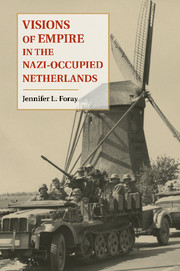Book contents
- Frontmatter
- Contents
- Acknowledgments
- Abbreviations
- Introduction
- 1 War Comes to the Kingdom
- 2 The Landscape of Resistance and the Clandestine Press
- 3 “Look to the East!”
- 4 “Indies Lost, Disaster Born”
- 5 Mutuality, Equality, and the Commonwealth
- 6 Countering the Commonwealth
- 7 “After Our Liberation, That of Indonesia”
- 8 Wartime Consensus and Postwar Pressures
- Conclusion
- Bibliography
- Index
- References
5 - Mutuality, Equality, and the Commonwealth
The Queen’s Speech of December 7, 1942
Published online by Cambridge University Press: 05 December 2011
- Frontmatter
- Contents
- Acknowledgments
- Abbreviations
- Introduction
- 1 War Comes to the Kingdom
- 2 The Landscape of Resistance and the Clandestine Press
- 3 “Look to the East!”
- 4 “Indies Lost, Disaster Born”
- 5 Mutuality, Equality, and the Commonwealth
- 6 Countering the Commonwealth
- 7 “After Our Liberation, That of Indonesia”
- 8 Wartime Consensus and Postwar Pressures
- Conclusion
- Bibliography
- Index
- References
Summary
Whereas Dutch resisters considered the prospects of imperial rebirth from their perspective as an occupied people – or, as some of them would have it, subjects in a new Nazi empire – exiled politicians and policy makers conceived of their respective empires in a distinctly global context. Whether in London or dispersed throughout their overseas territories, these exiles maintained closer contact with one another than did, for instance, French and Dutch resisters, who by and large showed little interest in transnational antiresistance efforts. Further, according to historians Paul Sorum and Andrew Shennan, metropolitan French resisters were not especially concerned with their nation’s colonies. The same could not be said for their leaders in exile. The final year of the war, in fact, saw a flurry of empire-related activity, much of it centered on the prospects of a new French federation. On January 30, 1944, General Charles de Gaulle opened the Brazzaville Conference assembling representatives from both his Free French government-in-exile and the French colonies in Africa. The agenda for this imperial conference contained a slate of potential political, economic, and social reforms to be implemented in “black Africa” after the coming Allied victory. By the time of the Brazzaville Conference, other realms of the French empire had already been provided a glimpse into their possible future. On December 8, 1943, de Gaulle’s government-in-exile – the French National Liberation Committee, or CFLN – publicly promised the people of French Indochina “a new political status” within some type of “federal organization.” This yet-to-be-determined structure would grant the Indochinese new liberties and opportunities, such as access “to all forms of employment and public offices in the Empire,” but “without losing the original stamp of the Indo-Chinese civilization and traditions.” Speaking in Constantine, Algeria, four days later, de Gaulle sent further shockwaves throughout the French empire. Now, he announced the CFLN’s decision not only to increase the proportion of Muslims serving in local assemblies and administrative positions, but also to grant French citizenship to tens of thousands of Algerian Muslims. In essence, he held out the promises of a kind of junior citizenship, to be bestowed on select Algerian subjects deemed deserving of this new status.
- Type
- Chapter
- Information
- Visions of Empire in the Nazi-Occupied Netherlands , pp. 149 - 187Publisher: Cambridge University PressPrint publication year: 2011



